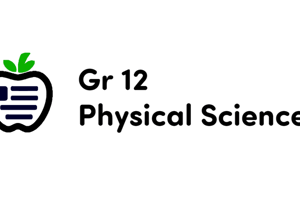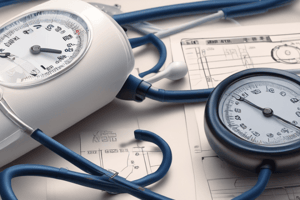Podcast
Questions and Answers
What is the primary characteristic of the alarm reaction stage in the general adaptation syndrome?
What is the primary characteristic of the alarm reaction stage in the general adaptation syndrome?
- Immediate physiological response to a threat (correct)
- Chronic stress with psychological impact
- Adaptation to ongoing stressors
- Repair process after stress exposure
How does cortisol function in relation to stress?
How does cortisol function in relation to stress?
- It decreases heart rate during stress
- It induces panic attacks
- It aids in relaxation and calmness
- It provides energy to respond to stressors (correct)
What distinguishes eustress from distress?
What distinguishes eustress from distress?
- Eustress triggers the fight-or-flight response; distress does not
- Eustress is moderate, associated with positive feelings; distress is intense and negative (correct)
- Eustress is always harmful; distress is always beneficial
- Eustress results from major life changes; distress is routine
What is biofeedback primarily used for?
What is biofeedback primarily used for?
In which physiological process does the fight-or-flight response primarily participate?
In which physiological process does the fight-or-flight response primarily participate?
Which of the following best describes daily hassles?
Which of the following best describes daily hassles?
What are cardiovascular disorders primarily concerned with?
What are cardiovascular disorders primarily concerned with?
What is meant by coping in the context of stress?
What is meant by coping in the context of stress?
Which of the following terms describes a tendency to experience emotional distress such as anger and fear?
Which of the following terms describes a tendency to experience emotional distress such as anger and fear?
What is the primary function of lymphocytes in the body?
What is the primary function of lymphocytes in the body?
Which term refers to a situation where there are high job demands coupled with low control over the work situation?
Which term refers to a situation where there are high job demands coupled with low control over the work situation?
The hypothalamic-pituitary-adrenal (HPA) axis is primarily responsible for regulating what in response to stress?
The hypothalamic-pituitary-adrenal (HPA) axis is primarily responsible for regulating what in response to stress?
What is job burnout characterized by?
What is job burnout characterized by?
What does optimism refer to in psychological terms?
What does optimism refer to in psychological terms?
Hypertension is defined as what condition?
Hypertension is defined as what condition?
Which of the following best describes the concept of perceived control?
Which of the following best describes the concept of perceived control?
What is the primary appraisal in the context of stress?
What is the primary appraisal in the context of stress?
Which stage follows the stage of resistance in the general adaptation syndrome?
Which stage follows the stage of resistance in the general adaptation syndrome?
What does psychoneuroimmunology study?
What does psychoneuroimmunology study?
Which of the following best describes Type A behavior pattern?
Which of the following best describes Type A behavior pattern?
What is the Social Readjustment Rating Scale (SRRS) designed to measure?
What is the Social Readjustment Rating Scale (SRRS) designed to measure?
What role does social support play in stress management?
What role does social support play in stress management?
In stress processes, what are stressors?
In stress processes, what are stressors?
What is the relaxation response technique primarily aimed at achieving?
What is the relaxation response technique primarily aimed at achieving?
Flashcards
Alarm Reaction
Alarm Reaction
The initial stage of the body's response to a stressor, characterized by the release of adrenaline and cortisol, preparing the body for 'fight or flight'.
Eustress
Eustress
A type of stress that is positive and motivating, and is often associated with optimal performance and well-being.
Distress
Distress
A type of stress that is negative and overwhelming, often leading to exhaustion, burnout, and health problems.
Fight-or-Flight Response
Fight-or-Flight Response
Signup and view all the flashcards
Biofeedback
Biofeedback
Signup and view all the flashcards
Daily Hassles
Daily Hassles
Signup and view all the flashcards
General Adaptation Syndrome (GAS)
General Adaptation Syndrome (GAS)
Signup and view all the flashcards
Coping
Coping
Signup and view all the flashcards
Health Psychology
Health Psychology
Signup and view all the flashcards
Immune System
Immune System
Signup and view all the flashcards
Immunosuppression
Immunosuppression
Signup and view all the flashcards
Hypertension
Hypertension
Signup and view all the flashcards
Primary Appraisal
Primary Appraisal
Signup and view all the flashcards
Secondary Appraisal
Secondary Appraisal
Signup and view all the flashcards
Stage of Resistance
Stage of Resistance
Signup and view all the flashcards
Stage of Exhaustion
Stage of Exhaustion
Signup and view all the flashcards
Type A Personality
Type A Personality
Signup and view all the flashcards
Type B Personality
Type B Personality
Signup and view all the flashcards
Study Notes
General Adaptation Syndrome (GAS)
- GAS is a three-stage model of the body's physiological response to stress
- Stages: alarm reaction, resistance, and exhaustion
- Alarm reaction: the body's immediate physiological reaction to a threat
- Resistance: the body adapts to the stressor
- Exhaustion: the body's ability to resist stress breaks down
Stress
- Stress is a process where an individual perceives and responds to events they appraise as overwhelming or threatening
- Stressors: environmental events that trigger stress
- Daily hassles: minor irritations or annoyances of everyday life that can cause stress
- Distress: a harmful form of stress
- Eustress: a positive form of stress
- Coping mechanisms: mental or behavioral efforts to manage stress
HPA (Hypothalamic-Pituitary-Adrenal) axis:A set of structures in the limbic system and endocrine system that regulate body's physiological response to stress- Cortisol: a stress hormone released by the adrenal glands.
- Biofeedback: techniques using electronic equipment to measure a person's involuntary activity and help them gain control.
Cardiovascular Disorders
- Disorders that affect the heart and blood circulation system
Positive/Negative Affect
- Positive affect: feelings of happiness, joy, excitement
- Negative affect: feelings of anger, contempt, disgust, fear, guilt, and nervousness
Health Psychology
- Subfield devoted to studying psychological influences on health, illness, and how people respond to illness
- Investigating the link between psychological factors and health.
- Example: influence of stress on heart diseases
Happiness
- An enduring state of mind characterized by joy, contentment, and a sense of meaning.
Job Burnout
- A general sense of emotional exhaustion and cynicism related to one's job
- Associated with negative effects on work performance and health
Fight or Flight
- A physiological reaction resulting from a perceived threat
- An example of the sympathetic nervous system's function
- Heart rate, respiration increase, sweating etc.
Flow State
- Intense engagement in an activity, often experienced during creative endeavors, work, or leisure
- Associated with positive feelings and optimal performance
Asthma
- A psychophysiological disorder obstructing the airways of the respiratory system
- Often difficult to expel air from the lungs
Type A/B Personalities
- Type A: competitive, impatient, rushed, hostile
- Type B: relaxed, laid-back
Social Support
- Support from others
- Advice, guidance, acceptance etc.
Immunosuppression
- A reduction in the effectiveness of the immune system
- Stress is among the factors that could cause this
Psychological/Physiological Disorders
- Physical/mental symptoms resulting from stress
Studying That Suits You
Use AI to generate personalized quizzes and flashcards to suit your learning preferences.




